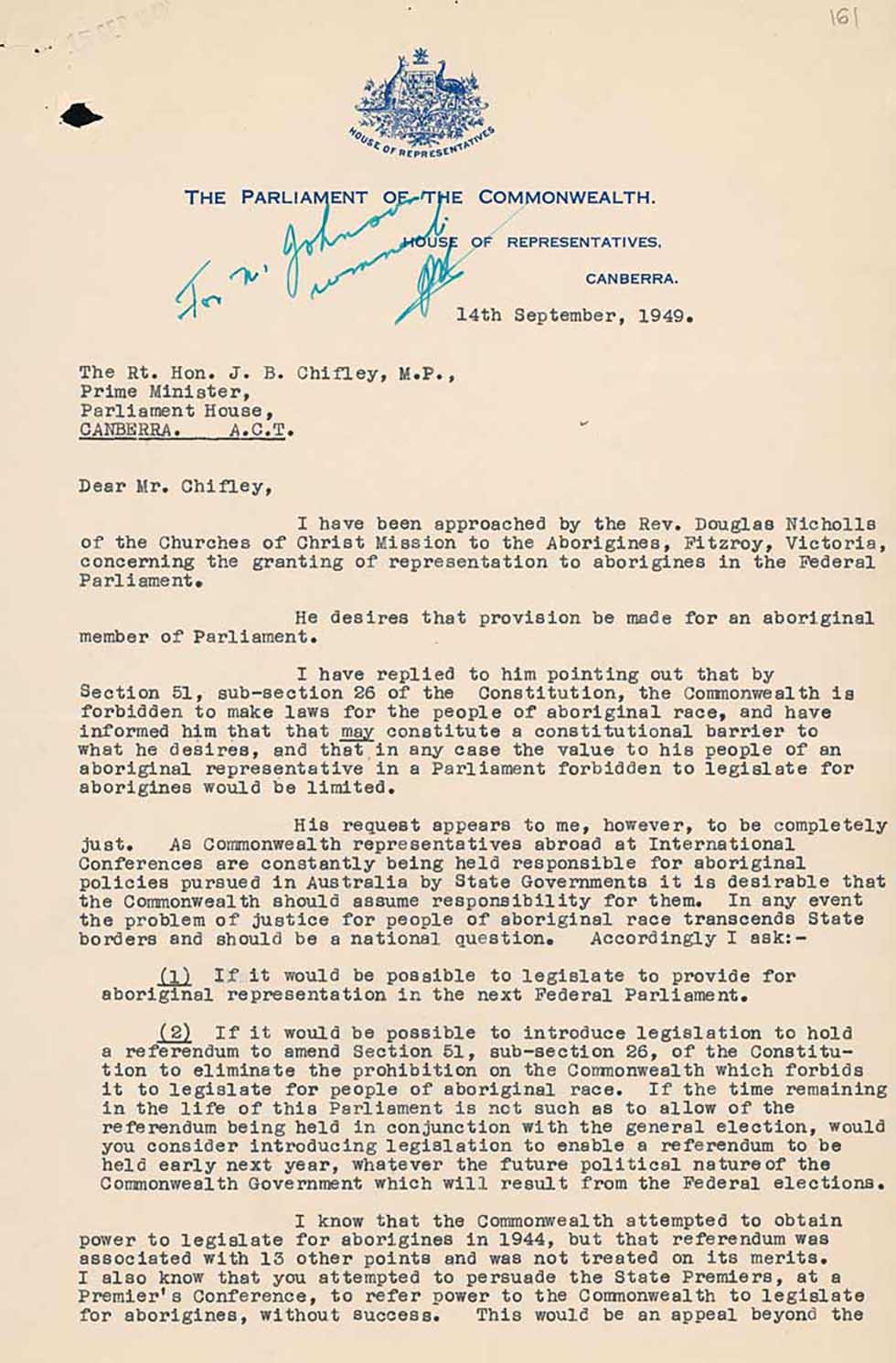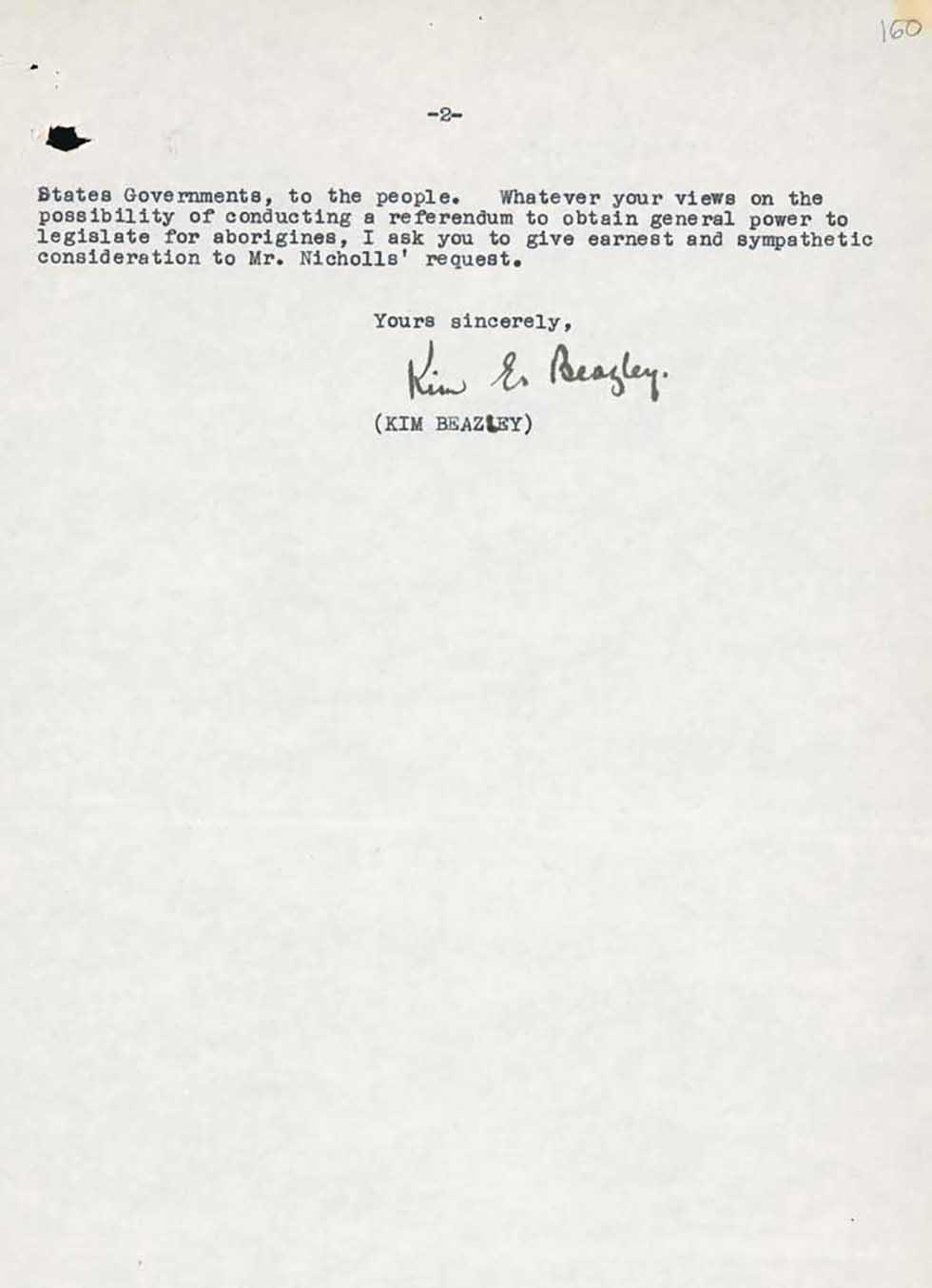
Item ID 66384. Page number 25, Representation of Aborigines in Commonwealth Parliament

Item ID 66384. Page number 26, Representation of Aborigines in Commonwealth Parliament
Aboriginal and Torres Strait Islander people should be aware that the National Archives' website and collection contain the names, images and voices of people who have died.
Some records include terms and views that are not appropriate today. They reflect the period in which they were created and are not the views of the National Archives.


Item ID 66384. Page number 25, Representation of Aborigines in Commonwealth Parliament

Item ID 66384. Page number 26, Representation of Aborigines in Commonwealth Parliament
[Page 1]
[Letterhead in blue ink with the Australian coat of arms and the text ‘THE PARLIAMENT OF THE COMMONWEALTH’, ‘HOUSE OF REPRESENTATIVES’, ‘CANBERRA’.]
[Handwritten annotation in light blue ink:] For Mr. Johnson forward. [Illegible initials.]
14th September, 1949.
The Rt. Hon. J. B. Chifley, M.P.,
Prime Minister,
Parliament House,
CANBERRA. A.C.T. [underlined]
Dear Mr. Chifley,
I have been approached by the Rev. Douglas Nicholls of the Churches of Christ Mission to the Aborigines, Fitzroy, Victoria, concerning the granting of representation to aborigines in the Federal Parliament.
He desires that provision be made for an aboriginal member of Parliament.
I have replied to him pointing out that by Section 51, sub-section 26 of the Constitution, the Commonwealth is forbidden to make laws for the people of aboriginal race, and have informed him that that may [underlined] constitute a constitutional barrier to what he desires, and that in any case the value to his people of an aboriginal representative in a Parliament forbidden to legislate for aborigines would be limited.
His request appears to me, however, to be completely just. As Commonwealth representatives abroad at International Conferences are constantly being held responsible for aboriginal policies pursued in Australia by State Governments it is desirable that the Commonwealth should assume responsibility for them. In any event the problem of justice for people of aboriginal race transcends State borders and should be a national question. Accordingly I ask: -
(1) If it would be possible to legislate to provide for aboriginal representation in the next Federal Parliament.
(2) If it would be possible to introduce legislation to hold a referendum to amend Section 51, sub-section 26, of the Constitution to eliminate the prohibition on the Commonwealth which forbids it to legislate for people of aboriginal race. If the time remaining in the life of this Parliament is not such as to allow of the referendum being held in conjunction with the general election, would you consider introducing legislation to enable a referendum to be held early next year, whatever the future political nature of the Commonwealth Government which will result from the Federal elections.
I know that the Commonwealth attempted to obtain power to legislate for aborigines in 1944, but that referendum was associated with 13 other points and was not treated on its merits. I also know that you attempted to persuade the State Premiers, at a Premier’s Conference, to refer power to the Commonwealth to legislate for aborigines, without success. This would be an appeal beyond the
[Page] -2-
States Governments, to the people. Whatever your views on the possibility of conducting a referendum to obtain general power to legislate for aborigines, I ask you to give earnest and sympathetic consideration to Mr. Nicholls’ request.
Yours sincerely,
[Handwritten signature:] Kim E. Beazley
(KIM BEAZLEY
This is a letter from Labor Member of Parliament Kim E Beazley (Senior) to Prime Minister Ben Chifley.
Beazley explains that he is writing the letter because Douglas Nicholls approached him personally to discuss the need for an Aboriginal member of Parliament.
Douglas Nicholls was a Yorta Yorta man who made a significant contribution to many areas of public life in Australia. He was an activist, pastor, soldier and footballer who went on to become the first Aboriginal Governor of South Australia.
When this letter was written in 1949, Nicholls was a representative of the Australian Aborigines League (AAL), an organisation founded by William Cooper, who was his uncle. The AAL lobbied state and federal governments on behalf of Aboriginal peoples.
Kim Beazley (Senior) states that he thinks Nicholls' request for Aboriginal representation in Parliament is 'completely just.' At the time, First Australians were largely excluded from voting in federal elections, and the Australian Parliament's power to make laws for First Australians was limited by the Constitution.
Beazley asks the Prime Minister whether it would be possible to:
Beazley pointed out that an Aboriginal member of parliament's impact would be limited if the Australian Parliament remained unable to make laws for First Australians. He argued that justice for Aboriginal and Torres Strait Islander peoples is a national issue that should be addressed at a national level.
Although the letter concludes with an appeal to the prime minister to 'give earnest and sympathetic consideration to Mr. Nicholls' request,' history shows that the Chifley Government did not take action on Aboriginal representation in parliament or on a referendum to change s51 (xxvi) of the Constitution.
Throughout the 1950s and into the 1960s, activists like Doug Nicholls and the AAL continued to campaign for equal rights, raising awareness for their cause among politicians and the broader Australian community. A milestone was achieved in 1962 when the Australian Parliament passed a law to give Aboriginal and Torres Strait Islander peoples the right to vote in federal elections and to stand for election.
In 1967, the Australian Government under prime minister Harold Holt held a referendum to address the sections of the Constitution that discriminated against First Australians. This included amending s51(xxvi) of the Constitution so that Parliament could make laws for Aboriginal and Torres Strait Islander peoples. 90.77% of Australians voted in favour of the proposed changes, making it the most successful referendum in Australian history.
Today, the Australian Constitution does not recognise Aboriginal and Torres Strait Islander peoples as Australia's First People. In 2023, Australia held a referendum on whether to recognise the First Peoples of Australia in the Constitution through the establishment of an Aboriginal and Torres Strait Islander Voice, a recommendation from the Uluru Statement from the Heart. On 14 October 2023, the Australian people voted against the establishment of an Aboriginal and Torres Strait Islander Voice.
This letter was written 18 years before the 1967 referendum. What might have motivated Douglas Nicholls and the AAL to continue campaigning for constitutional change over the course of almost two decades?
Learn how to interpret primary sources, use our collection and more.
